Heysel tragedy
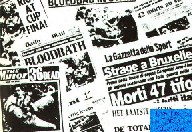
39 people were killed in the wild riots that broke out before the Champions Cup final between Juventus and Liverpool on May 29 in 1985. 400 people got injured in the tragedy in Brussels. Hundreds of Millions of shocked Televison viewers could almost not believe what they were seeing. This was one of the worst incidents in the history of sport and the consequence was that English clubs were banned from European tournaments. The riots started 1,5 hours before the game when the Liverpool fans reacted to provocation, broke through a small fence and attacked the Juventus supporters. The Italians fled and many were crushed against a three meter high brick wall that collapsed. Many fans died under the remains of the wall. Some fans were killed by beating, and the englishmen even used rocks and knifes to worsen the situation. Liverpool supporters charged Juventus supporters, causing 39 deaths. The circumstances under which this dreadful event occurred reveal a far more complex set of causes, and an insight into terrace culture at the height of the football hooligan phenomenon.
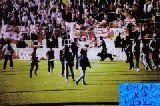
The events in Rome in 1984
It can be argued that the Heysel Stadium Tragedy really began the year before. Liverpool had reached the European Cup Final for the fourth time in their history. The Final was to be held on the home ground of their opponents, AS Roma. After a tense game, Liverpool won in a penalty shoot-out. What received rather less coverage was the roaming scooter gangs hunting down Liverpool supporters, stabbing and slashing dozens, many of whom were family groups returning to hotels in the area. One 13-year-old boy was almost ripped apart, needing 200 stitches in his face alone. Many hoteliers refused to let their English guests in, either out of spite or for fear of subsequent attacks on their premises. There was little protection from the Italian Police, who routinely attacked and robbed English supporters in revenge for the defeat of the local team. That night, many desperate English fans, deserted by Italian coach drivers booked to drive them to Rome airport, sought sanctuary at the British Embassy. After the events in Rome, club rivalries in England had been put aside: Juventus were to catch the full fury of the English hooligan elite. It should be understood that not just Liverpool hooligans were present. There were contingents from a great many firms all over the country, from Luton MIGS to Millwall Bushwackers, West Ham ICF and Newcastle Toon Army.
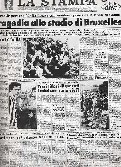
Hooligan culture in the 1980's
There have been countless attempts to rationalise football hooliganism. Many cite what is seen as the inherent violence of the English working class. Others argue that somehow fighting is in the gene pool, a nation that has sent almost every generation of its men folk to war throughout antiquity has produced a social stratum naturally predisposed to violent disorder. It could simply be that if 40,000 people are crammed into one place and given even the slenderest reason to confront each other, there will be a small proportion that will do so, and a greater proportion that will allow themselves to be drawn in. Whatever the reasons, by the mid-1980s violence was endemic in and around football grounds throughout England. With little closed-circuit television and largely indifferent policing, hooligan 'firms' had carte blanche to set about each other wherever they met. Indeed, terrace violence had attained a certain glamour.
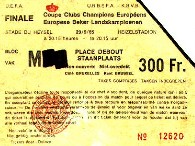
Although the major London firms of West Ham, Millwall and Chelsea attracted the most media attention, almost any club was capable of attracting hundreds if not thousands of willing combatants. Leeds United were particularly notorious, as were Newcastle United, Cardiff City, Swansea City, and the Sheffield and Manchester clubs. Violence between Cardiff and Swansea was so bad that for a while it seemed likely that the fixture would be deleted from the season's programme altogether, and the result decided by the Pools panel. In Cambridge, city councillors attempted to ban visiting supporters after Millwall wrecked the city centre. Luton Town went one step further and actually did ban opposing supporters, simultaneously introducing an identity card scheme for home fans after Millwall fans rioted through their town. 'Spotters' were employed to report on the movements of opposing supporters. The banning of alcohol from grounds did little to stem the violence. Injecting oranges with vodka was one imaginative solution. Others simply drank outside the ground or took drugs. Most were happy enough to 'mix it' while completely sober.

Despite the prevailing terrace culture, Liverpool supporters had no particular reputation for violence, outside of an intense rivalry with Manchester United (during the 1985 FA Cup semi-final between the teams, supporters had hurled golf balls with eight inch nails driven through them at each other). However, news of what had happened in Rome spread quickly. It became clear that some sort of reprisal was considered to be in order. The perfect opportunity presented itself the following year, when Liverpool again reached the European Cup Final and again faced an Italian team, Juventus of Turin. Even the most placid terrace fan knew that there was going to be unfinished business to attend to at the Heysel Stadium.
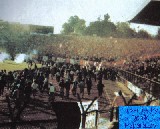
Terrible organization
Built in the 1920s, the Heysel Stadium was quite simply the worst venue in the world to host such a volatile encounter. The game was due to be the last match ever played at the ground, as it had been condemned many years previously for failing to meet modern standards of safety and design. As a result, little money had been spent upon it, and large parts of the stadium were crumbling. There was little segregation of supporters, a factor exacerbated by the indiscriminate selling of black market tickets by touts. Many fans found that it was possible to enter the ground by simply lifting a section of the flimsy fencing that surrounded the terraces. There had been skirmishes around Brussels all day, and local police responded by getting fans into the stadium as quickly as possible, rather than arresting and detaining offenders.
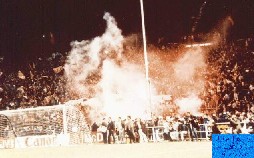
This stewarding of rival fans proved to be crucial as the tragedy unfolded: as there was no way of knowing who was in the ground and where they were, it was impossible for police to weed out known troublemakers, and easy for pockets of hard core hooligans to assemble wherever they wished. As a result, two hours before kick off, perhaps the most malevolent assembly of football supporters ever seen in one place had gathered, and as far as they were concerned, it was payback time. It should be understood that not just Liverpool hooligans were present. There were contingents from a great many firms all over the country.
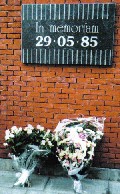
The wall that crumbled
Violence was immediate. Italian fascists, who were present in force among the Juventus contingent, goaded supporters into making incursions into the main body of Liverpool fans, at the Western end of an enormous shared terrace. What were initially scuffles quickly escalated into a series of serious terrace battles. Then, 20:45 local time, something dreadful happened. The Liverpool fans charged into a solid mass of Juventus support, which was hemmed in on three sides by crumbling concrete walls. Unstoppable force had met immovable object.
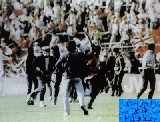
The Juventus supporters attempted to fall back. However, with no avenue of retreat, they simply piled on top of each other. Panic set in among the Italians, some of whom were now starting to be crushed at the rear of the terrace as the Liverpool supporters continued to charge against the front. At this moment, with police and stewards too stunned to react, a wall at the Eastern end of the terrace gave way. Dozens of Juventus supporters were now trapped against what remained of the wall, and were trampled underfoot as thousands of people stampeded over them. It was at this point that the majority of the deaths occurred.
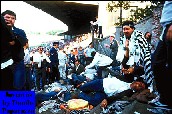
Meanwhile, there was mayhem in the ground itself. Italian supporters invaded the pitch in an effort to get at the English. All over the stadium violence erupted. It appeared that one Italian fan was firing a gun into the Liverpool fans: this later turned out to be a starting pistol. In desperation, several Liverpool players spoke across the public address system in an attempt to calm the supporters. Eventually, with the arrival of police reinforcements and elements of the Belgian army, enough order was restored for the match to take place. Neither set of players wanted to play. However, it was felt that even more carnage might ensure if rival supporters were allowed to rampage through Brussels. In one of the most meaningless matches ever played, Juventus won 1-0 with a goal by French star Michel Platini.
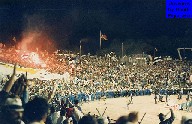
The Belgian police
The belgian police were too few and totally helpless. They could only watch the terrible tragedy that was happening. Scared supporters tried to run to the pitch to save themselves, but the fighting continued there. Dead and injured people were all over, and the televison viewers could watch bleeding and screaming fans running around. The dead people were gathered outside the stadium and the injured were brought to the hospitals. Heavy police reinforcemets arrived at the stadium much too late and the players of the two clubs tried to calm down their fans. The tragedy was already a fact, but the situation could have gotten even worse. The game was played to give the police more time to handle the situation after the game. The kickoff was made almost 1,5 hours after the supposed kick off. Juventus didn't want to play, but gave in after pressure.
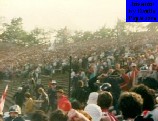
The belgian police were heavily criticised after the disaster for not beeing prepared. The police had already been warned that violence could occur and that they had to carefully divide the supporters of the two teams. Instead only 5 police officers divided the rival supporters and they couldn't do anything when the Liverpool supporters stormed against the Juventus supporters. Had there been a high fence, a wall or much more police officers the disaster wouldn't have happened. Many fans could have been saved if the Belgian government hadn't put opp fences between the stands and the pitch. If these fences hadn't been there, then many more supporters could have escaped from the rage of the english supporters. It is estimated that about 100 drunk englishmen started the riots. The Belgian police also told that the english supporters had behaved violently and aggresive all day. They had started riots round the historic Grand Place in Brussels, and all restaurants in the area had to close.

In the morning of the final the supporters had fraternized at first, but later that afternoon fighting broke out between the fans. After the tragedy had happened the captains of the two teams, Phil Neal and Gaetano Scirea, spoke over the speaker and told that the game would be played to allow the police to organize and prepare for when the supporters would leave the stadium. The first message that arrived told of injured people, then news came that someone had died, later it was told that 24 fans had died, before this number was adjusted up to 36. After the game it became clear that 39 persons had died, while 400 had got injured. The Juventus fans took down all their banners, while the Liverpool supporters still held up theirs. Long after the tragedy was a fact huge police and army forces arrived to the stadium to prevent further fighting, but it was all too late. When the game started the pitch was totally surrounded by a wall of armed forces. The stadium looked like a war zone.
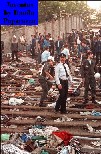
As more and more armed forces arrived the Juventus fans attacked them. They had heard rumours about casualties and filled with rage they wanted revenge. Television pictures showed a Liverpool fan who was chased and hit with a rock in his head, another Liverpool fan wearing a Liverpool jersey ran from the Juventus fans and was later filmed bleeding from his head. The fighting bteween the Juventus supporters and the armed forces continued even after the kick off, with the Italians throwing everything they could find against the armed forces. Exactly one hour after the game should have started a small group of Juventus supporters showed a huge banner were it was written Reds Animals. On TV you could hear the Juventus supporters in the stadium applauding this banner. Juventus didn't want to play, but the kick off was still made at 21.42, over one hour later than scheduled.
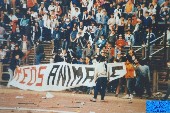
The stadium
The stadium was crumbling and in no fit state to hold the game, Liverpool's Chief Executive Peter Robinson urged UEFA not to allow the game to be played
there, but they didn't listen. Muck of the blame lays with UEFA and the Belgian authorities. Supporters who were present at the match described the stadium as a disgrace, certainly not fit for a European final. They said many people without tickets were able to get in through holes in walls and fences. Even some supporters who had a ticket have told that some of them never had to show it to get into the stadium. There was also inadequate policing to prevent any violence. The actions of the minority of Liverpool supporters who charged the Z zone contingent at Heysel was inexcusable, however Juventus fans cannot be excused from blame. Rumours tell that Juventus supporters had taunted, throwed stones, bottles, weapons at the Liverpool supporters during the build-up and so inevitably some so-called Liverpool fans charged and ran
towards the Juventus fans, who unfortunately panicked and ran towards the
wall which collapsed killing 39 fans. Some Juventus supporters also launched missiles against the Liverpool supporters.
The stadium itself was frightening to behold. Steel crush barriers at the Italian end of the terrace were bent and buckled entirely out of shape, in a grisly testament to the force of the Liverpool charge. It was in many respects fortunate that the wall had collapsed, as it is estimated that had it not done so the death toll could have been many times higher. In an unpleasant twist of fate, Liverpool supporters themselves experienced exactly what happens when force is unable to dissipate four years later, when 96 of their own number were crushed to death as a result of overcrowding at the 1989 FA Cup Semi Final at Hillsborough, England.
The reactions
Everyone agreed that the english supporters were responsible for the tragedy. The British embassy in Italy and British offices all over Italy were attacked in the days after the tragedy. The next morning, flowers were left on the doorsteps of Italian restaurants all over Liverpool. Fans arriving home seemed unable to grasp what they had witnessed. In Brussels, dozens of supporters were quizzed by police, although relatively few custodial sentences were passed. The supporters were described as 'fighting mad' by the Belgian police. One had to be injected with six times the amount of tranquilliser required to knock out a horse in order to calm down enough to be interviewed.
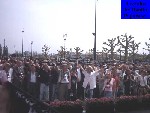
Official reaction was swift: English teams were banned from European competition for five years. This damaged the English game as top players, deprived of competing at European level, chose to play on the Continent instead. Also, several smaller clubs, whose domestic performances would otherwise have qualified them for the various European tournaments, missed their chance. Margaret Thatcher and the Queen issued formal apologies to the people of Belgium and Italy. Bobby Charlton told that this night he was ashamed of beeing British and that the British supporters were to blame. A series of sweeping police anti-hooligan offensives saw several known 'Generals' jailed, although many hooligans simply decided that they had seen enough, and abandoned terrace violence altogether.
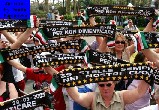
The official declaration of Margareth Thatcher was: "There are
no words, there are are no possible justifications; the blame is entirely
for England!" Thatcher called to come inmediately to Downing Street
from Mexico City, where they were, FA President Frederick A. Millichip
and General Secretary Edgar A. Croker for a delicate confrontation with
her Government. And two days before the UEFA's decision to ban England
(June 2), the English Government expressed (May 31) its own exemplary decision
about a kind of auto-exclusion at all Eurocups of all English clubs. Civil, Military and sporting Belgian Authorities envolved in the responsibility of the Final Match organisation and were found guilty. The history then ended
with a series of difficult trials against only a little number of those
hundreds of hooligans, some people identified by witnesses and by multimedial
evidences.

There were many reasons why the circumstances surrounding the events of the 1985 European Cup Final arose. Had it not done so at the Heysel Stadium, something similar was bound to have happened somewhere, such was the level of antagonism surrounding English football at the time. Until the Heysel Stadium, the terraces of English football grounds were little more than filthy concrete expanses where tens of thousands of people were literally locked in and left to their own devices for a couple of hours every Saturday afternoon. After Heysel, the authorities were no longer able to dismiss terrace violence as little more than working class lads letting off steam. In the years that followed many of the huge fan banners on display wherever Liverpool played incorporated a Juventus flag as a mark of respect to the victims of the most shocking night European football has ever seen.
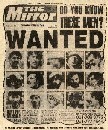
The main reasons for the tragedy:
- ROME 1984: Some british supporters wanted revenge against the italians after they received a heavy beating in Rome by the Roma supporters in 1984.
- OVERCROWDING: There were sold more tickets than the actual capacity and many managed to come in with false tickets or even without tickets. The Belgian authorities knew very well that there were thousands of false tickets circulating, but did nothing to prevent them for entering the stadium. The stadium that had a 50 000 capacity was totally overcrowded and had too much people in it.
- THE POLICE: Even if the police had been warned that there would be fighting there was almost nobody present to do something when the fighting broke out. Only 5 police officers divided the Liverpool and Juventus supporters were the fighting broke out.
- THE STADIUM: A large fence or a wall could have been enough to prevent the supporters from coming into contact. The Heysel stadium was a disgrace anw was crumbling.
- THE JUVENTUS SUPPORTERS: Some Juventus supporters had launched objects against the Liverpool supporters who then reacted and stormed against the Juventus fans.
- THE LIVERPOOL SUPPORTERS: Many drunk englishmen who behaved like animals and continued to chase and press the Juventus supporters against the wall that crumbled.
- ALCOHOL: Some fans were so drunk that they didn't realize the tragedy that had happened and continued to fight instead of helping those who needed help.
- UEFA: They had done a horrible job selecting a crumbling stadium to host the final. The organization of the match was terrible.
- THE BELGIAN AUTHORITIES: They were totally unprepared and had too few police officers present at the game. The reinforcements came much too late. They didn't listen to warnings.

A monument in memory of the victims outside the stadium in Bruxelles.
Juventus-Liverpool 20 years after:
Liverpool and Juventus met again in 2005 for the first time since the 1985 final in Brussels, won by Juventus, but overshadowed by the death of 39 Juventus fans. Juventus fans had long been hoping to meet Liverpool again, and they were extremely content to meet them 20 years after the Heysel tragedy. It was no secret that thousands of Juventus supporters planned to take revenge on the fans who killed 39 Juventus fans. The directors of Juventus and Liverpool wanted to use their Champions League quarter-final tie to commemorate the Heysel stadium disaster. Liverpool chief executive Rick Parry immediately stated that he intended to work closely with Juventus in an effort to mark the 20th anniversary of the disaster.
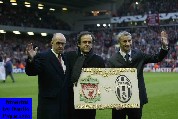
The threats:
Immediately after the Champions League draw, Juventus supporters started using the Internett to threaten the Liverpool supporters. 39 Juventus supporters lost their lives the last time these two teams met. English clubs were banned from European competions for five years, while Liverpool were banned for seven years. Various websites made threats telling that they hadn't forgot about what happened and that they would seek revenge. One website had the headline: ”Now it's time for the Liverpool supporters to get shot”. Another website explained that while the clubs have a good relationship, the Juventus supporters still hate Liverpool.
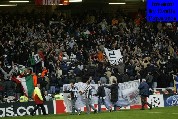
Other websites expressed their fear about what might happen. With thousands of Liverpool fans wandering around Turin, some Juventus supporters feared their club could get banned from European competions following what could happen. Another website had a picture of masked and armed Juventus supporters, under there was written that nobody could expect that the Juventus fans would shake the hands of the Liverpool supporters. Most Juventus websites were sure that there would be violence in Turin, and in fact they were right. But he violence was less serious than expected due to enormous police forces at the stadium.
Commemorative gestures:
Liverpool honoured the memory of the 39 victims of Heysel with a number of commemorative gestures in the lead-up to the first Champions League tie with Juventus. First there was a friendship match between the Liverpool and Juventus fans that took place at the Academy in Liverpool. A Kop Mosaic featuring the word Amicizia (friendship) alongside a Liver Bird and the respective club colours, was displayed in conjunction with a one minute silence prior to kick-off.
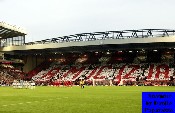
Every visiting fan received a free four-page brochure in Italian aimed at promoting friendship and understanding between the supporters. The front cover carried the club crests and words of welcome. Inside there was a personal message to the Juventus fans from Ian Rush and the split image picture showing him in Liverpool and Juventus kits.
On the back there were the words for: We Are Sorry. You'll Never Walk Alone. Every visiting fan also received a special wristband in red, white and black with the inscription friendship in both Italian/English. Commemorative Juventus/Liverpool scarves and t-shirts were sold. The matchday programme was also completely re-designed to pick up on the friendship theme. The cover carried the hand of friendship logo used on the scarf. The teams were removed from the back page and replaced by an image of the Memoria e Amicizia banner.
A banner carrying the theme ”In Memoria e Amicizia” (In Memory and Friendship) message was carried by fans from the Kop to the Juventus end prior to kick-off. Phil Neal, Liverpool captain at Heysel in 1985, performed this ceremony with Michel Platini. The banner also carried the Christian names of the 39 Heysel victims and the symbolic union of the Liverpool Liver Bird and the Juventus Zebra.

The Juventus fans turned their backs:
Liverpool hadn’t expected the enormous hate from the Juventus supporters and nothing went as planned. The English authorities had planned to welcome the Juventus supporters with open arms at the airport in Liverpool and sent the Major of Liverpool along with an Italian delegate to receive them. But these two delegates were met with insults and hate by the Juventus supporters that arrived from Italy.
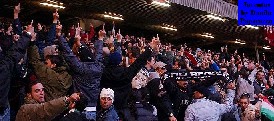
10 Juventus supporters refused to stop for customs and forced their way through, these fans were followed and arrested by the Police. There was no violence inside the stadium, but the Juventus fans showed with songs, behaivour and gestures that they will never forgive. After the game the plane which flew back the Juventus players was delayed with over an hour. The English authorities wanted to make sure that the Juventus supporters and their flights took off first.
The real Juventus supporters had announced that they wouldn't make peace with the fans who killed 39 of their own and they maintained their word. When Rush and Platini carried the memory and friendship banner over to the Juventus section, the supporters turned their back, showed their finger and song the Italian anthem. And when The Kop displayed their mosaic with "Amicizia" written over it, the Juventus supporters responded by singing the well known English animals song.
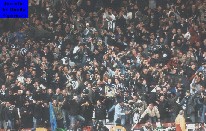
Early on the day of the match a friendly was played between the Juventus Club London and the Liverpool fans. The stupid thing was that those who played for "Juventus" were supporters living in England and not the supporters from Turin who follow the team every week. Two of the players weren't even Italian. The Juventus supporters living in Italy were furious at the Juventus Club London for playing the match and they are now considered to be huge traitors. As the Juventus supporters say: Some of us can forgive, but nobody of us will ever be friends with the fans that killed 39 of our own.
The fear of the Liverpool fans:
Liverpool won the first leg 2-1, but it soon became clear that the Liverpool fans feared the Juventus supporters who were looking for revenge in Turin. Liverpool struggled and didn’t manage to sell its ticket allocation for the second leg in Turin amid fans fears over their safety. Liverpool fans were also warned by police not to travel to Turin unless they had bought tickets from the club.
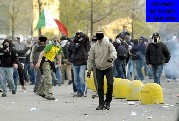
Quite a number of Liverpool fans that usually go to European games were thinking twice about going over to the game in Turin. Part of it was down to experiences they had when they went over to Rome a few years ago, when there was a really nasty atmosphere, and that the Italian police still see Liverpool fans as hooligans.
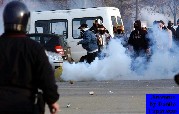
Many Liverpool fans didn’t blame the Juventus fans for turning their backs at Anfield. Liverpool supporters still fight for justice for Hillsborough, and a lot of Juventus supporters feel the same way about Heysel. Some Liverpool supporters admitted that their own reaction in their place wouldn't have been any different. A chief of police in Liverpool strongly encouraged all the travelling Liverpool fans to use the shuttle buses which would carry them directly from the town centre into the ground.
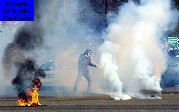
Violence seemed almost inevitable in the days prior to the game, as many Juventus forums kept receiving threatening messages of violence from Juventus supporters. Messages like: "We have waited for revenge for 20 years", "No English supporters will leave the Delle Alpi alive" and "Prepare your knifes" had been posted on the various forums. The police in Turin were particlularly worried about what could happen in the city centre.
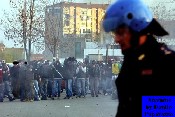
A spokesman of the Liverpool Independent Supporters Association expressed that talk of Juventus fans looking for revenge was unsettling. Liverpool were given 3,600 tickets for the match but they only managed to sell 2,200 of those tickets, as most fans were concerned about potential reprisals from Juventus supporters.
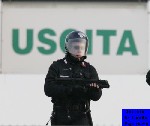
Violence before the second leg:
One Liverpool supporter was attacked and sent to hospital, three cars were burned, heavy fighting between Juventus supporters and Police forces, a bomb that was thrown outside the Delle Alpi and missiles and other objects were thrown against the Liverpool supporters inside the stadium.
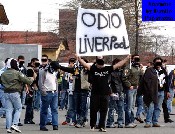
These were the things that happened in occasion of the second leg between Juventus and Liverpool. But it could have been much worse, only enormous amounts of police officers prevented more violence.
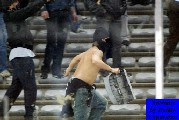
The build up to the match in the city centre was calm, also because the Liverpool supporters were well protected. Outside the stadium it was a whole other story. The fighting outside the Delle Alpi stadium started one hour before the match. When the busses carrying the Liverpool supporters arrived about 500 Juventus supporters immediately tried to attack.
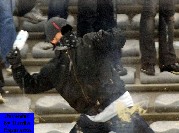
The fans were masked and armed with many dangerous objects. The police formed a living wall to prevent contact between the two sets of supporters. The Juventus supporters responded by throwing bottles, rocks, missiles and other dangerous objects against the police. Three cars were set on fire, two of these were police cars, in the incidents outside the stadium.
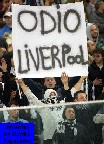
The police replied by firing tear gas against the Juventus supporters. One of these gas bottles hit a Juventus supporter right in the face and he was immediately sent to hospital. When the situation calmed outside the away supporters section, new incidents occured outside La Curva Sud.
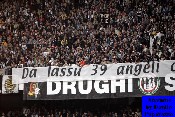
The police were performing heavy controls at the entrance and the fans responded by trying to force their way innside the stadium,. Many of these probably didn’t have tickets for the game either. The police again responded by firing tear gas and the Juventus supporters once again started throwing objects against the police.
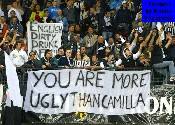
When the game kicked off the violence calmed down, but he Juventus supporters placed in La Curva Nord threw objects againts the Liverpool supporters for the entire match. And the Liverpool supporters also reacted to the provocation.
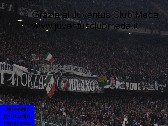
After the game the dissapointed Juventus supporters left the stadium without creating any problems. The Liverpool supporters were forced to wait inside the Delle Alpi stadium until almost midnight. Afterwards they were immediately escorted right to the Caselle Airport in Turin.
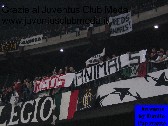
Eight Juventus supporters were arrested the night before the match for attacking and injuring a Liverpool supporter in the centre of Turin. The Juventus supporters were armed with dangerous objects when they attacked a group of Liverpool supporters sitting in a pub. The Juventus supporters then tried to run away in a car, but were arrested by the police. The Liverpool supporter got minor head injuries and had to spend the night at the hospital.
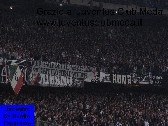
Four Juventus supporters were arrested for violence on the matchday..A Juventus supporter, a lifeguard from Teramo, was sentenced to eight months in prison for throwing objects at Liverpool supporters outside the Delle Alpi stadium. A fan from Genova was accused of injuring a police officer, while the other fans were accused of throwing objects against the bus carrying the Liverpool supporters and against the police.
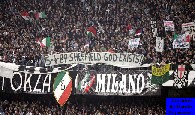
The names of the victims
Rocco Acerra (29)
Bruno Balli (50)
Alfons Bos
Giancarlo Bruschera (21)
Andrea Casula (11)
Giovanni Casula (44)
Nino Cerrullo (24)
Willy Chielens
Giuseppina Conto (17)
Dirk Daenicky
Dionisio Fabbro (51)
Jaques Francois
Eugenio Gagliano (35)
Francesco Galli (25)
Giancarlo Gonnelli (20)
Alberto Guarini (21)
Giavacchino Landinni (50)
Roberto Lorenzini (31)
Barbara in Margiotta Lusci (58)
Franco Martelli (46)
Loris Massore (28)
Gianni Mastroiaca (20)
Sergio Bastino Mazzino (38)
Luciano Rocco Papaluca (38)
Bento Pistalato (50)
Patrick Radcliffe
Demenico Ragazzi (44)
Antonio Ragnanese (29)
Claude Robert
Mario Ronchi (43)
Domencio Russo (28)
Tarcisio Salvi (49)
Gianfranco Sarto (47)
Mario Spanu (41)
Amedeo Giuseppe Spolaore (55)
Tarcisio Venturin (23)
Jean Michel Walla
Claudio Zavaroni (28)
Luigi Pidone (31)
LEARN FROM HEYSEL: VIOLENCE IS STUPID.
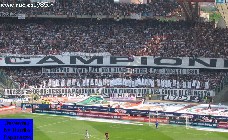
Back to main page












































